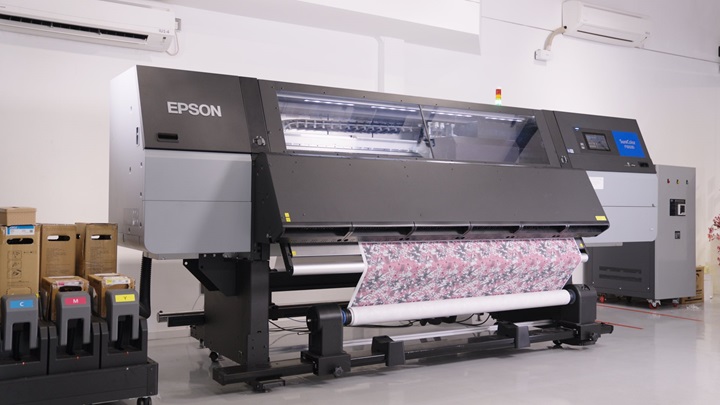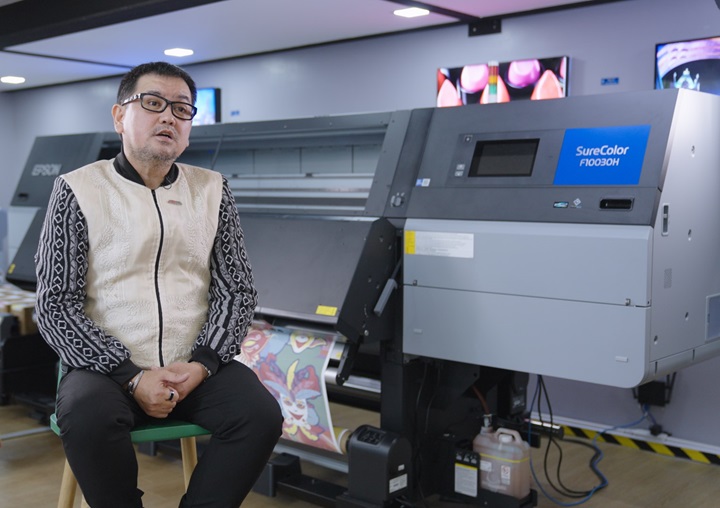
Epson, a global leader in professional printing, has announced its collaboration with ASEAN Fashion Designers Showcase (AFDS) to raise awareness on sustainable fashion through innovative technology.
As part of the collaboration, Epson partnered with seven local designers from Singapore, Indonesia, Laos, Malaysia, the Philippines, Thailand, and Vietnam to create a unique fashion collection with a sustainability theme that ties in with the cultural roots of their respective countries. The full “Sustainability in Asia” collection will be unveiled during Epson’s LFP Innovation Day in Bangkok on March 21, 2024. Leading up to the main event, the designs will be showcased at their respective country’s Epson Solution Centers across the region.
The designers are leveraging Epson’s line of dye sublimation printers including SureColor SC-F6430, SureColor SC-F9430H, and SureColor SC-F10030 to produce bright and sharp colour apparel pieces for these unique collections.

Showcase, explains the design he made using Epson’s dye sublimation printer.
Filipino designer Dave Ocampo represents the Philippines at this year’s AFDS. Ocampo focuses on creating ready-to-wear styles that are both wearable and classic, while also prioritizing sustainable practices by sourcing fabrics locally and supporting local communities. His designs aim to make fashion accessible to the public, emphasizing sleek and timeless silhouettes.
“The collection aims to showcase the beauty of the Philippines through colors, symbols, and patterns,” shared Ocampo. “The design highlights Philippines’ very own colorful festivals, cultural symbols that are deeply rooted in its history, and patterns that are uniquely tied to its heritage and identity. Partnering with Epson for digital textile printing allows us to bring the details and vibrant colors to life.”
Sublimation transfer is an easy printing method in which the design is first printed on a dye sublimation transfer media. Using only a combination of heat and pressure, the design on this media will then be transferred directly onto the fabric. With this method, the ink will be bonded to the fabric, resulting in permanent, vibrant prints that are fade resistant.
Unlike conventional printing which requires a substantial amount of water for fabric preparation, dyeing and rinsing, digital textile printing that uses dye sublimation is a more environmentally conscious approach for apparel companies as it produces less waste. It also minimizes over-production as designers can produce printed fabric as required. This ensures fashion designers will be able to maintain a sustainable textile printing business while significantly reducing the cost as well as environmental impact.
Additionally, going digital enables designers to have full creative freedom to print anything imaginable and on-demand. The technology allows them to create and produce complex designs, giving designers endless variations and options that suit their respective tastes.
“We are thrilled to collaborate with AFDS to raise awareness on sustainable digital textile printing through a creative showcase on apparels with these established and aspiring ASEAN designers,” said Masako Kusama, President of Epson Philippines Corporation. “Guided by our brand message, ‘Engineered for Good,’ Epson is continuously exploring different ways to co-create sustainability technology solutions that truly enrich our communities and address issues surrounding the environment. It is part of our long-term mission to improve the sustainability standards across different industries including the textile industry.”
“The team of designers with AFDS are excited to participate in this unique partnership with Epson, aligning with their shared vision for the future of fashion and technology. The collaborative designs crafted for this venture embody a vibrant fusion of fun, youthfulness, fashion-forward sensibilities, and practical wearability,” added Hayden Ng, Premier Founder and Singapore Fashion Ambassador of the ASEAN Fashion Designers Showcase. “Each of the seven designers has ingeniously translated their unique narratives, rooted in the cultural tapestry of their respective countries, and has artfully woven in their perspectives on sustainability and zero wastage in the production of these styles.”

